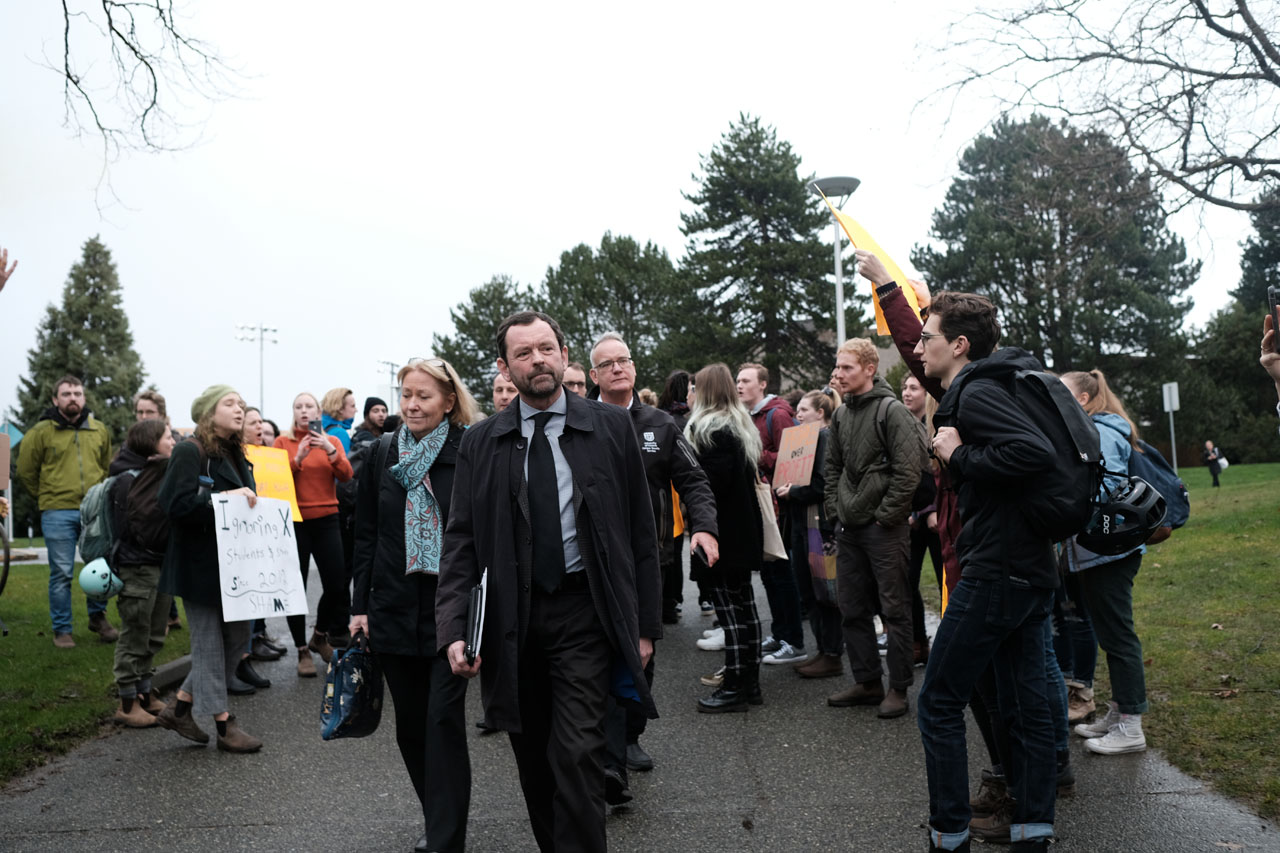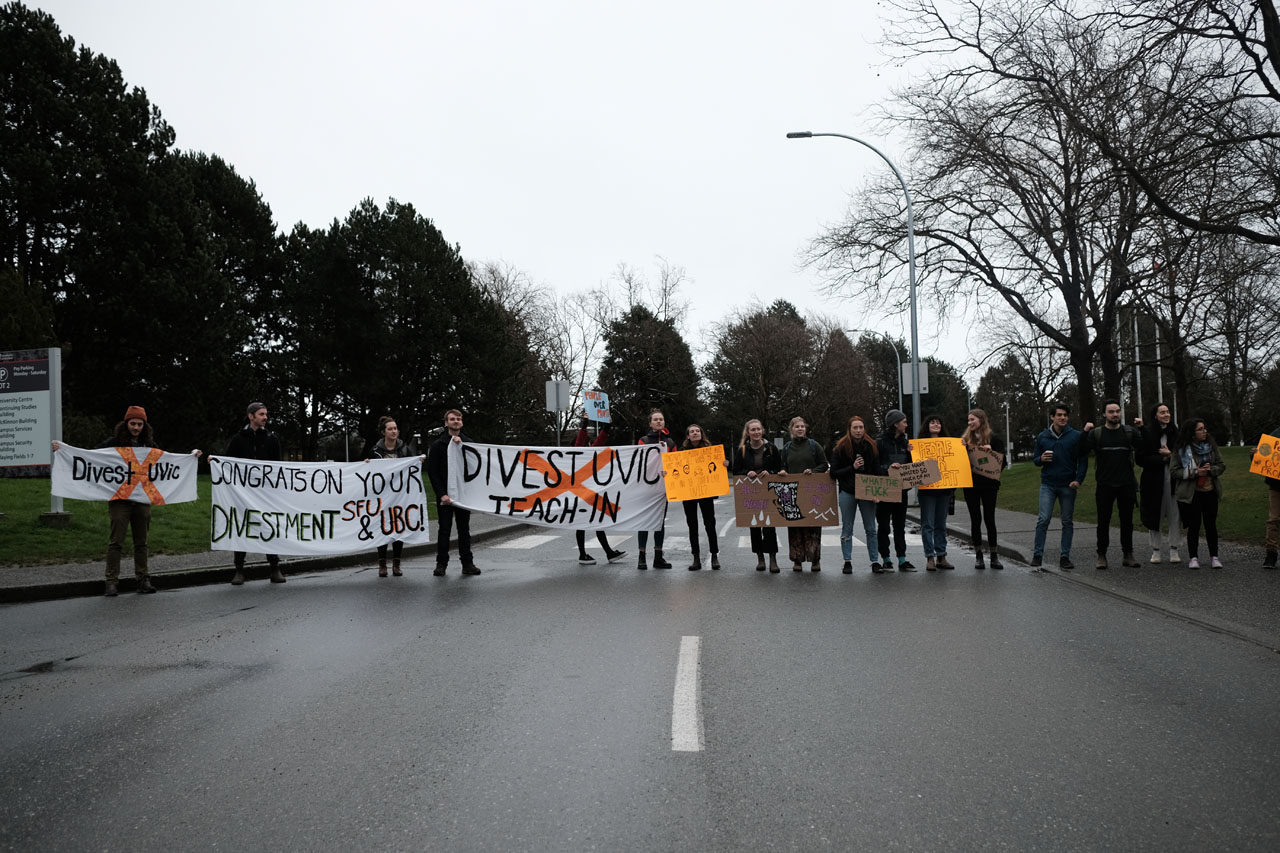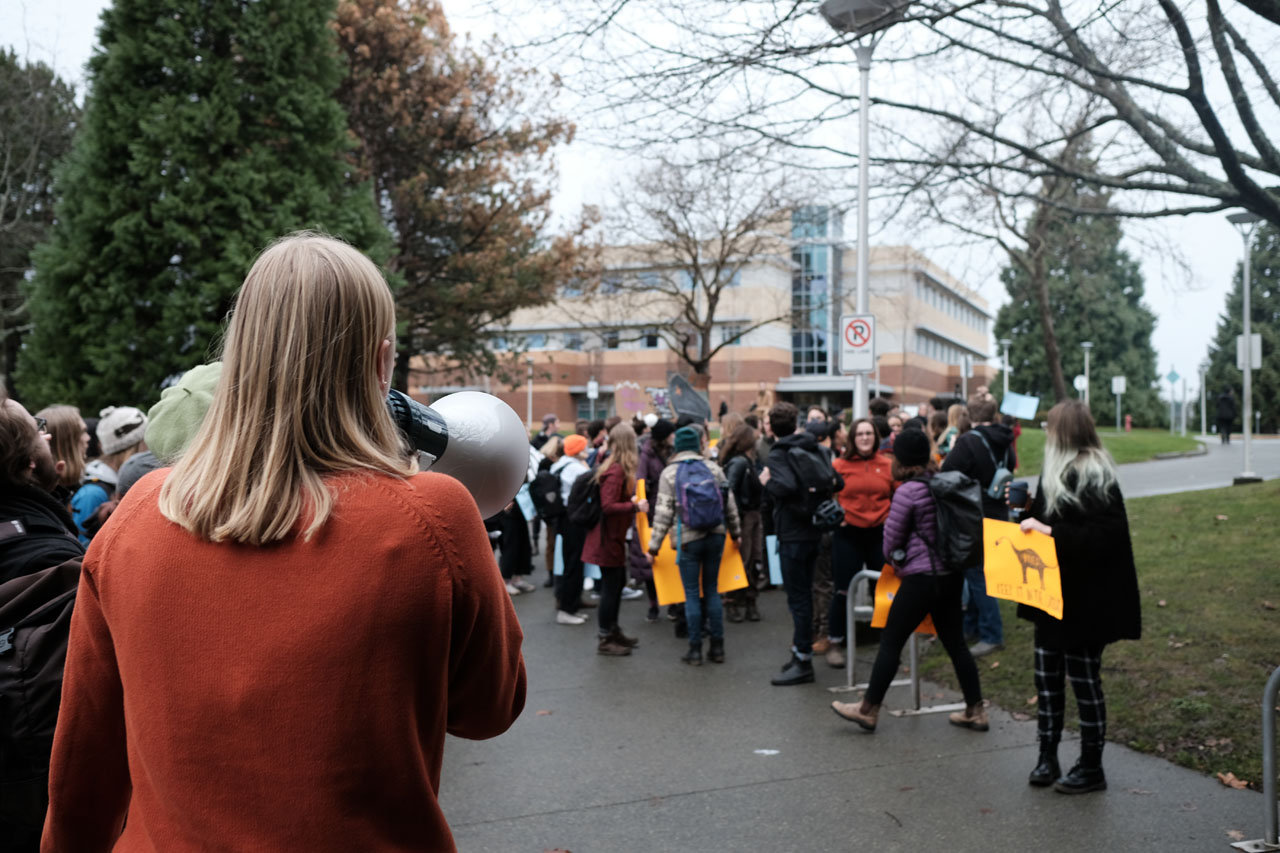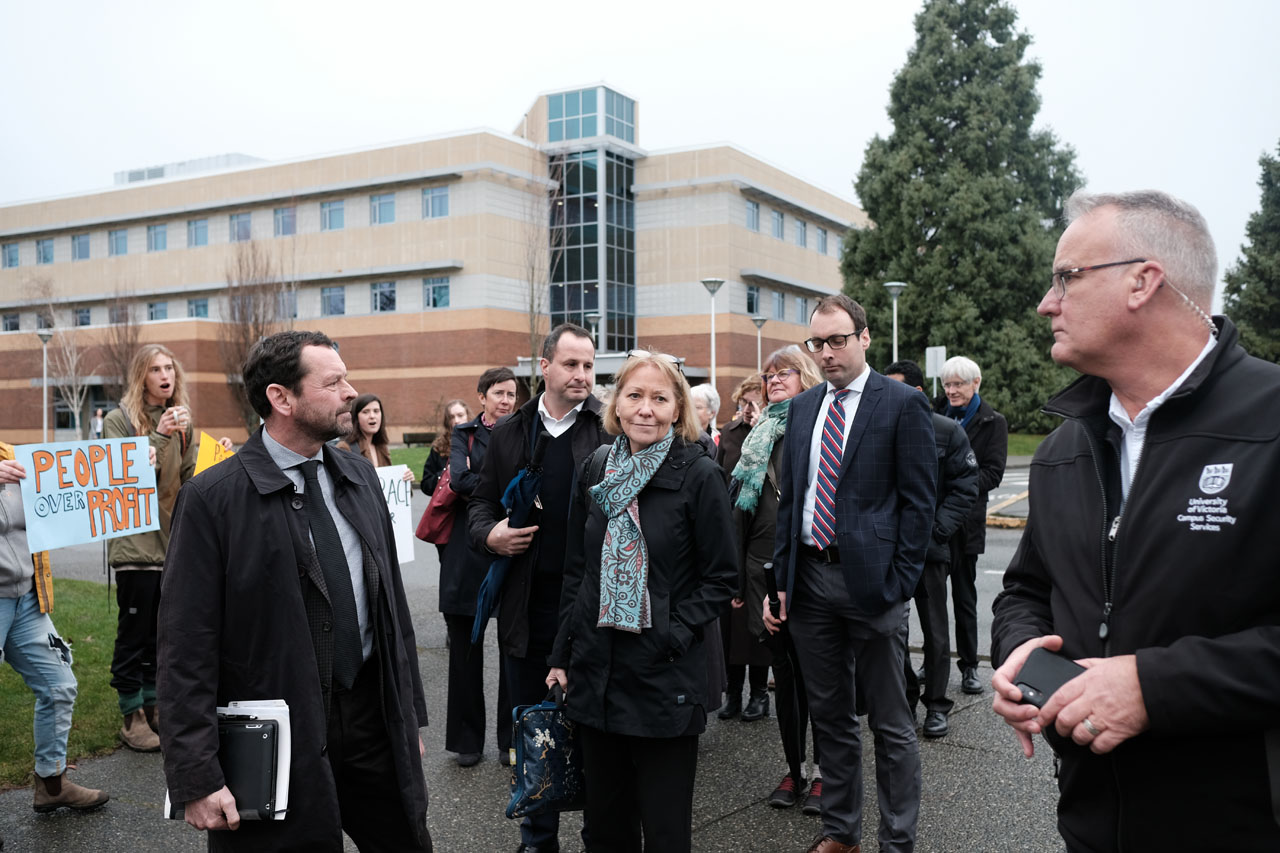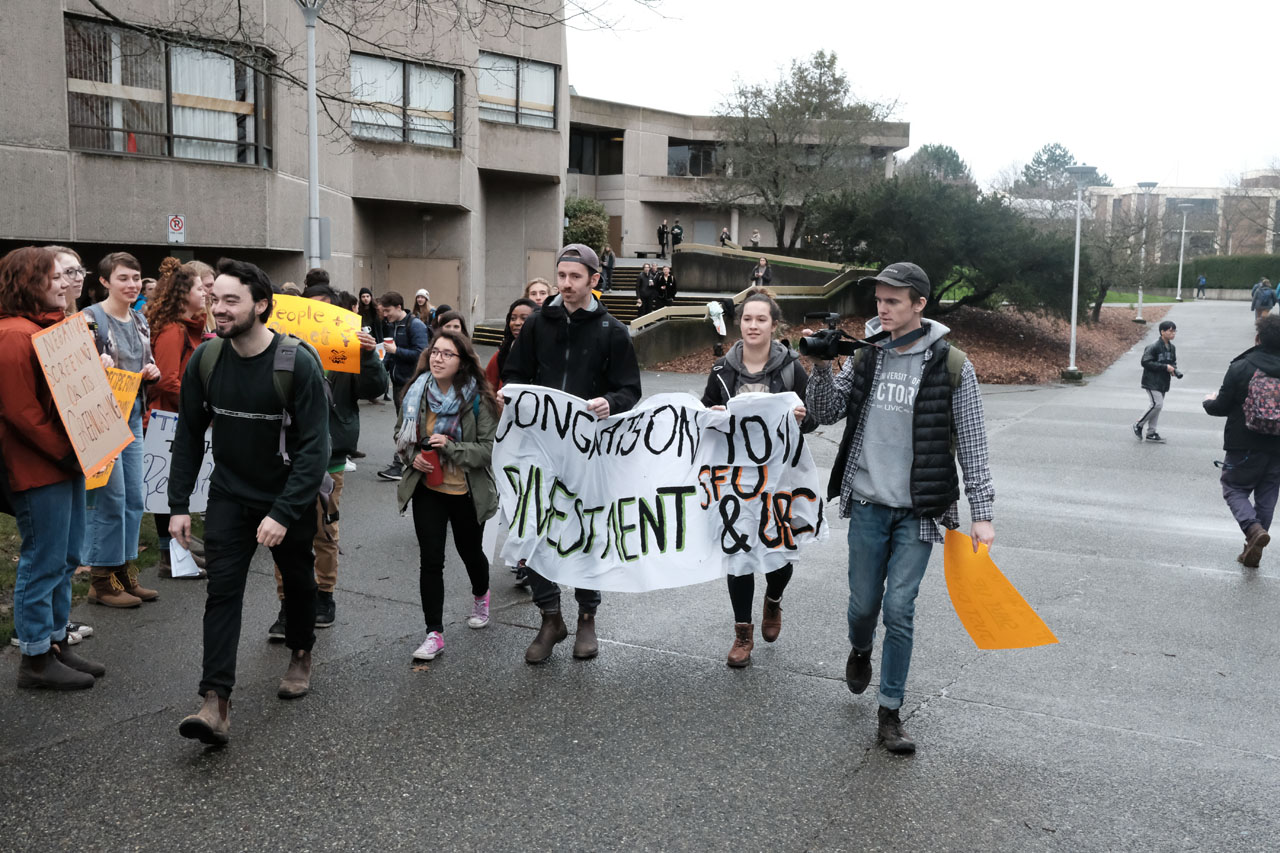45 per cent emissions reduction target for 2030 falls short of any divestment
This morning, the UVic Board of Governors (BoG) passed a motion to put forward a new Responsible Investment policy — which proposes reducing the “carbon intensity” of the university’s short-term investments and bonds portfolio by at least 45 per cent by 2030.
Before the meeting began, protestors from Divest UVic — a student-led group that has been one of the forces behind the seven year-long call for UVic’s divestment from fossil fuels — gathered in the University Centre.
A long line of protestors welcomed the board outside as they walked in, chanting “It’s our money it’s our school break it off with fossil fuels.” The crowd of over 50 students filed into the Farquhar Auditorium, alongside other members of the university community.
In addition to the new investment policy, the Board of Governors also heard a presentation on UVic’s sustainability plans and rescinded a policy for gender equitable hiring.
The meeting was brought to an abrupt conclusion following the vote on the Responsible Investment Policy, as chants from members of Divest UVic in the gallery drowned out the board members.
“This is the best policy that there is,” UVic’s President Jamie Cassels said, when asked about whether full divestment was possible in UVic’s near future. “This is a major milestone for the board.”
The policy could result in no emissions reductions whatsoever as it’s impossible, with current technology, to fully calculate the full carbon footprint of UVic’s short-term investments.
Cassels estimated that UVic simply divesting from fossil fuel producers would only impact 20 per cent of emissions, and said that the policy passed today seeks to looks to all sectors of the economy. This policy speaks to the “carbon intensity” of the portfolio — a term that essentially means the estimated overall emissions resulting from every investment in the portfolio combined.
UVic’s investment policy carries significant discrepancies with that of local universities that have recently committed to divesting from fossil fuels. Simon Fraser University, which Cassels mentioned as a model for UVic’s policy, committed to divesting 45 per cent of their endowment fund by 2025 — a more rapid and substantive move towards divestment than UVic’s policy. The University of British Columbia has voted to divest $380 million, with a commitment to working towards full divestment.
Divest UVic has called UVic’s policy “blatant greenwashing.” Greenwashing refers to speaking about being sustainable, without actually putting through substantive actions towards sustainability.
“UVic has once again shown that they would prefer to dump millions of dollars into a dying fossil fuel industry … instead of following the lead of the hundreds of other universities that supported long-term financial viability through divestment,” said Paarth Mittal, a UVic student and Divest UVic organizer.
Although the exact investment holdings are not public, Divest UVic estimates UVic invests $20 million in the fossil fuel industry through their short-term investments and about $40 million through their endowment fund.
The new policy only concerns short term investments, and would look at investments across all economic sectors to determine the carbon footprint of those investments. Cassels claims this is a better solution than full divestment.
“While it will not result in industry-wide divestment from all fossil fuel extraction companies, the screening criteria outlined in the revised policy in many ways goes further as it will apply to high carbon emitting companies in all industries,” the Responsible Investment policy report submitted to the board explained.
The policy could result in no emissions reductions whatsoever as it’s impossible, with current technology, to fully calculate the full carbon footprint of UVic’s short-term investments. Given that the 45 per cent reduction could also be spread across various areas of the portfolio, this would allow UVic to retain their investments in fossil fuels while still meeting this policy’s goal.
“It isn’t even partial divestment,” Juliet Watts, the UVSS Director of Campaigns and Divest UVic executive said at a press conference following the Board meeting. “This administration is falling us … Divestment is the right moral and financial decision.”
“It’s a lofty, ten-year long shameful response.”
UVic has aligned this policy with the Intergovernmental Panel on Climate Change (IPCC) report. The IPCC report stresses that if the global temperature rises too much above pre-industrial levels, environmental consequences will be dire. It is unclear exactly how the university’s investment plan will definitely alter carbon emissions in a way that substantially impacts the earth’s temperature for the better.
Before the motion was passed, BoG elected student representative Isabella Lee voiced her support for divestment and called this policy a “first step.”
However, Cassels later clarified to the Martlet after the meeting that this is likely the only step UVic is likely to take in the near future. Although he can not speak for the board’s decisions going forward and that discussions will likely continue, Cassels stated that he feels the new policy is the best and most robust option for UVic to tackle climate change.
In the coming months, Divest UVic plans to focus on ways in which they can shift the makeup of the Board of Governors. To this end, Watts announced her intention to run for the BoG as a student representative, and further stated plans to ask UVic alumni not to donate to UVic until they divest.
“The issue of carbon intensity, the issue of climate change — it’s going to be an issue, ongoing. I’m sure that on campus there will be continued dialogue about it,” said Cassels. “I really appreciate [the campus conversation], and we’ve listened — we’ve listened very, very carefully to the student input on this.”
“Students are passionate, and they’ve been providing input in a whole variety of ways and I’m sure they’re going to continue doing that.”



